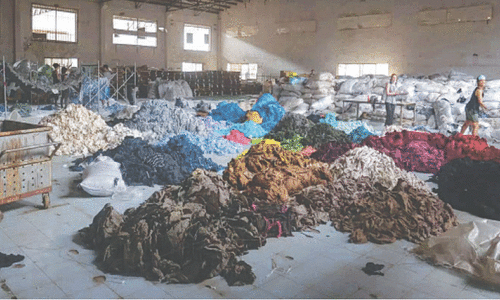Price is the end product of all economic activities in a prevailing economic and financial landscape. The inflation rate rises when the economy heats up as a result of high growth as well as in the case of unaffordable domestic demand in a contracting economy.
Pakistan’s economic growth is neither investment-led nor export-oriented but is overwhelmingly consumption-driven. And in these turbulent times, price is determined less by the cost of production and relatively more by domestic and international financial architecture.
Inflation is fuelled by too much money chasing too few goods. According to the State Bank of Pakistan’s data, the currency in circulation in the domestic economy has surged by 29 per cent, up from 27.5pc a year ago, thus rising to Rs9.1 against Rs31.15 of the total value of money in the system.
The currency in circulation, economist Ammar Habib Khan pointed out in 2022, made up 20pc of GDP, increasing from 8pc only a decade ago. This long-term trend can be attributed to excessive government borrowings to finance the growing fiscal deficit. And the bulk of the debt was used to finance non-development expenditures, with the country’s tax revenue potential remaining substantially unrealised.
In the past, instances of inflation-related turmoil have seen significant regime changes around the world
In its economic update and outlook for July, the finance ministry attributed the entire increase in current government spending to an 80pc surge in mark-up payments driven by a high policy rate.
The ministry disclosed a 20pc upswing in total spending to reach Rs8.85 trillion during July-May FY23 and a 22pc hike in current expenditure to hit $8.34tr. Non-mark-up spending recorded a 12pc reduction, mainly due to 31pc decline in subsidies and 32pc decrease in grants.
During the quarter of August-October, the government plans to borrow a staggering Rs11.09tr from domestic commercial banks. Bank financing to the private sector has already plunged 87pc owing to costly credit, free fall of the rupee and uncertain economic conditions.
Almost the entire amount of remittance sent by overseas Pakistanis is utilised in financing imports of foreign goods and domestic consumption and is not channelised into productive avenues.
Earlier this month, a Rs80billion incentive package for banks and currency dealers was approved to boost remittances and enhance foreign reserves to reduce the volatility in the forex market.
Pakistan collects more taxes from inflation than from economic activities — the bulk of which are indirect taxes, such as sales tax, which also push up prices
“One crucial factor contributing to the devaluation of the Pakistani rupee is the rising imports which need to be curtailed before focusing on boosting of exports,” says a joint statement issued recently by the Lahore and Multan Chambers of Commerce and Industry. Their observation can be seen against the backdrop of merchandise export earnings falling for 11 months in a row, plunging by 8.6pc to $2.06bn in July.
On the other hand, substantial domestic consumption is met by dollar debt-financed imports, made costlier owing to prevailing international prices as well as rupee devaluation. For example, with local production lower than domestic consumption, a record 1.34m tonnes of pulses worth $946m were imported during FY23.
In early August, prices of sugar shot up to Rs150-165 per kg from Rs131-132 in the first week of July, reportedly mainly on account of hoarding by a market segment. Weekly inflation recorded a year-on-year surge of 29.83pc for the week ending on August 3 due to a sharp rise in petroleum and food prices. The petrol retail prices were raised by 7.86pc, diesel by 7.82pc, and LPG by 9.82pc during the period under review.
To quote an analyst, increases in oil and energy prices impact food inflation quickly as the rising transportation cost make up a substantial part of the cost of food production and supplies. Instead of removing the deficient energy sector’s inefficiencies, the focus remains on passing on the full cost of gas and electricity to the consumers.
‘Rockets and feathers’ is the economists’ name for how prices change in some less competitive markets, wrote Peter Coy in his recent article in New York Times titled ‘Companies aren’t eager to cut prices as costs fall.’ When a company’s input costs go up for some reason, the prices they charge their customers go up like a rocket. When their input costs go back down, their prices fall, but slowly like a feather, he explains.
Cartels reduce output/supplies to inflate prices. Geopolitics, international sanctions, wars, natural disasters and pandemics also trigger the high inflation rate.
Pakistan collects more taxes from the inflation of prices than from economic activities. The bulk of taxes in the form of indirect taxes, such as sales tax, also inflates prices. And owing to the particularly substantial size of the informal economy, the tax-to-GDP ratio dropped to 6.7pc in the last nine months of FY23 from 7.2pc in the same period of the previous year.
But the view that wage increases cause inflation is being questioned on the basis that economists are looking at the data wrong. Claims about inflation is rooted in unit labour cost are unsupported by the data, says Preston
Mui, senior economist at Employ America, a research and advocacy organisation fighting for full employment.
Inflation, he adds, is not the only factor in the calculation. Unit labour cost also rises if labour grows as a share of national income. The labour share has fallen essentially back to 2019 levels. In a historical context, it is hard to look at labour shares and conclude that compensation is too high relative to output.
Considering historical patterns of persistent inflation as documented by financial historian Professor Russel Napier in the Library of Mistakes publication and views of other learned scholars, a London-based Pakistani analyst suggests that Pakistan is heading towards structural change. He recalls that past instances of inflation-related turmoil have seen significant regime changes around the world.
Published in Dawn, The Business and Finance Weekly, August 14th, 2023














































